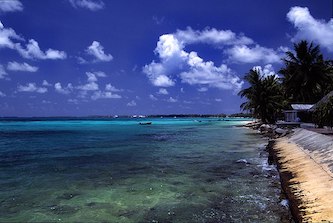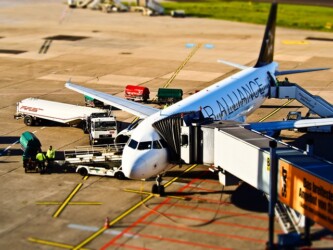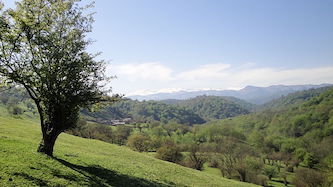Australia has made a significant agreement with Tuvalu, a small Pacific nation threatened by the effects of climate change. The agreement allows up to 280 Tuvalu citizens per year to live, work, and study in Australia. This is the first time Australia has offered residency to foreign nationals due to the threat of climate change. The pact, known as the Falepili Union, is considered the most significant agreement between Australia and a Pacific country. It also includes Australian assistance to Tuvalu on climate action and security.
In addition to offering refuge, Australia has pledged funding to help Tuvalu adapt to climate change, including financial support to expand the landmass of its main island. The agreement also includes a commitment from Australia to defend Tuvalu from military aggression, and Tuvalu has agreed not to enter defense pacts with other countries without Australia’s approval. New Zealand and the US have similar pacts with other Pacific nations.
Tuvalu, home to 11,200 people, has been grappling with the challenge of protecting itself from rising seas. The nation has taken steps to ensure its statehood remains intact, even in the face of the loss of its physical territory due to climate change. In January, Tuvalu also announced plans to create a digital version of itself in the metaverse to preserve its history and culture.
The Australian Prime Minister described the agreement as “ground-breaking,” while the Tuvalu Prime Minister called it “a beacon of hope.” The pact is seen as a significant step in ensuring regional stability, sustainability, and prosperity. This agreement marks a milestone in recognizing the responsibility of larger nations to support those most vulnerable to the impacts of climate change.
Original news source: Australia offers climate refuge to Tuvalu citizens (BBC)
Listen
Slow
Normal
Fast
Group or Classroom Activities
Warm-up Activities:
– News Summary
Instructions: Divide the class into small groups. Each group must summarize the article in their own words, focusing on the key points such as the agreement’s purpose, provisions, and its significance. Afterward, each group will present their summary to the class, and the teacher will highlight the use of advanced language structures and vocabulary.
– Opinion Poll
Instructions: Create a list of statements regarding the article’s content, such as “Climate change is the most pressing issue for Pacific nations” or “Countries like Australia should take more responsibility for climate refugees.” Students will move around the room and sign whether they agree or disagree with each statement. Afterwards, discuss as a class to explore the range of opinions and the reasons behind them.
– Future Predictions
Instructions: Ask students to write down their predictions about the impact of the Falepili Union agreement on Tuvalu and Australia over the next decade. They can consider aspects such as cultural integration, the effects on climate policy, and regional security. Then, have students share their predictions in pairs or small groups and discuss the likelihood and potential global implications.
– Keyword Taboo
Instructions: Write down keywords from the article (e.g., climate change, agreement, refuge, digital version, metaverse, regional stability). Students take turns describing the keywords to their team without using the word itself or five additional taboo words associated with it. This will encourage students to use synonyms and descriptive language to convey their ideas.
– Sketch It
Instructions: In pairs, students choose a scene or concept from the article, such as the digital version of Tuvalu, the rising sea levels, or the signing of the agreement. One student describes the scene to their partner without naming it, and the partner sketches it based on the description. This activity promotes listening skills and the use of descriptive language. Afterward, they can share their sketches and descriptions with the class.
Comprehension Questions:
1. What is the maximum number of Tuvalu citizens allowed to live, work, and study in Australia each year under the new agreement?
2. What is the name of the agreement between Australia and Tuvalu?
3. What type of assistance is Australia providing to Tuvalu, aside from residency?
4. What specific financial support has Australia pledged to Tuvalu in terms of adapting to climate change?
5. What commitment has Australia made in terms of Tuvalu’s military defense?
6. How has Tuvalu planned to preserve its history and culture in response to the threat of rising sea levels?
7. How did the Australian Prime Minister describe the agreement with Tuvalu?
8. What are the broader implications of the agreement for regional stability and the responsibility of larger nations?
Go to answers ⇩
Listen and Fill in the Gaps:
(1)______ has made a significant agreement with Tuvalu, a small Pacific (2)______ threatened by the effects of climate change. The agreement allows up to 280 Tuvalu citizens per year to live, work, and study in Australia. This is the first time Australia has (3)______ residency to foreign (4)______ due to the threat of climate change. The pact, known as the Falepili Union, is considered the most significant agreement between Australia and a Pacific country. It also includes (5)______ assistance to Tuvalu on (6)______ action and security.
In addition to offering refuge, Australia has pledged funding to help Tuvalu adapt to climate change, including financial support to expand the landmass of its main island. The agreement also includes a commitment from Australia to (7)______ Tuvalu from military aggression, and Tuvalu has agreed not to (8)______ defense pacts with other countries without Australia’s approval. New Zealand and the US have similar (9)______ with (10)______ Pacific nations.
Tuvalu, home to 11,200 (11)______, has been grappling with the challenge of protecting itself from rising seas. The nation has taken steps to ensure its statehood remains intact, even in the face of the loss of its physical territory due to climate change. In (12)______, Tuvalu also announced plans to create a digital version of itself in the metaverse to (13)______ its history and culture.
The Australian (14)______ Minister described the agreement as “ground-breaking,” while the Tuvalu Prime Minister called it “a beacon of hope.” The pact is seen as a significant step in (15)______ regional stability, (16)______, and prosperity. This agreement marks a milestone in recognizing the responsibility of larger nations to support those most vulnerable to the impacts of climate change.
Go to answers ⇩
Discussion Questions:
Students can ask a partner these questions, or discuss them as a group.
1. What is your understanding of climate change and how do you think it affects small island nations like Tuvalu?
2. How would you feel if your country was at risk of disappearing due to rising sea levels?
3. Do you think it’s the responsibility of larger nations to offer support to smaller countries affected by climate change? Why or why not?
4. What are some ways that you believe countries can help each other adapt to the consequences of climate change?
5. How would you react if your government decided to offer residency to citizens of another country because of environmental threats?
6. Do you like the idea of creating digital versions of countries in the metaverse to preserve their history and culture? Why or why not?
7. What do you think are the potential benefits and drawbacks of a country like Tuvalu creating a digital version of itself?
8. Do you think agreements like the Falepili Union could become more common in the future? Why or why not?
9. How do you think the citizens of Tuvalu might feel about the possibility of relocating to Australia?
10. What is your opinion on the stipulation that Tuvalu cannot enter defense pacts with other countries without Australia’s approval?
11. How do you think such migration agreements could affect the cultural identity of small nations like Tuvalu?
12. Do you believe that financial aid for expanding the landmass of an island is a sustainable solution to the problem of rising sea levels? Why or why not?
13. In what ways do you think the agreement between Australia and Tuvalu could influence regional stability and prosperity?
14. How would you propose ensuring that the sovereignty of nations like Tuvalu is respected in international agreements?
15. Do you think the concept of ‘climate refugees’ should be formally recognized in international law? Why or why not?
Individual Activities
Vocabulary Meanings:
Match each word to its meaning.
Words:
1. Tuvalu
2. Australia
3. Falepili Union
4. Pacific
5. climate change
6. residency
7. agreement
8. security
Meanings:
(a) Country offering residency to Tuvalu citizens
(b) Region where Tuvalu is located
(c) Environmental phenomenon causing global impact
(d) Protection from potential harm or danger
(e) Pact between Australia and Tuvalu
(f) Small island nation threatened by climate change
(g) Permission to live in a foreign country
(h) Mutual understanding between two parties
Go to answers ⇩
Multiple Choice Questions:
1. What is the name of the agreement between Australia and Tuvalu?
(a) Pacific Alliance
(b) Climate Compact
(c) Falepili Union
(d) Island Accord
2. How many Tuvalu citizens per year are allowed to live, work, and study in Australia under the agreement?
(a) 200
(b) 280
(c) 350
(d) 150
3. What is the population of Tuvalu?
(a) 20,000
(b) 8,500
(c) 15,000
(d) 11,200
4. Which other country has a similar pact with Pacific nations?
(a) New Zealand
(b) Canada
(c) Brazil
(d) South Africa
5. What has Tuvalu announced plans to create in the metaverse?
(a) A virtual reality game
(b) A social media platform
(c) An online marketplace
(d) A digital version of itself
6. What is Australia’s commitment to defending Tuvalu from under the agreement?
(a) To provide financial support for climate change adaptation
(b) To defend Tuvalu from military aggression
(c) To expand the landmass of Tuvalu’s main island
(d) To offer residency to Tuvalu citizens
7. What did the Australian Prime Minister describe the agreement as?
(a) “Ground-breaking”
(b) “Historic”
(c) “Unprecedented”
(d) “Revolutionary”
8. What is the significance of the agreement between Australia and Tuvalu?
(a) Expanding the landmass of Tuvalu’s main island
(b) Creating a digital version of Tuvalu in the metaverse
(c) Recognizing the responsibility of larger nations to support those most vulnerable to the impacts of climate change
(d) Providing financial support for climate change adaptation
Go to answers ⇩
True or False Questions:
1. Australia has not made an agreement with Tuvalu to allow up to 280 Tuvalu citizens per year to live, work, and study in Australia.
2. The agreement does not include a commitment from Australia to defend Tuvalu from military aggression, and Tuvalu has not agreed to enter defense pacts with other countries without Australia’s approval.
3. The agreement is not seen as a significant step in ensuring regional stability, sustainability, and prosperity, and does not mark a milestone in recognizing the responsibility of larger nations to support those most vulnerable to the impacts of climate change.
4. The Australian Prime Minister did not describe the agreement as “ground-breaking,” while the Tuvalu Prime Minister did not call it “a beacon of hope.”
5. This is the first time Australia has offered residency to foreign nationals due to the threat of climate change.
6. The pact between Australia and Tuvalu is known as the Falepili Union and is considered the most significant agreement between Australia and a Pacific country.
7. Tuvalu has announced plans to create a digital version of itself in the metaverse to preserve its history and culture.
8. Australia has pledged funding to help Tuvalu adapt to climate change, including financial support to expand the landmass of its main island.
Go to answers ⇩
Write a Summary:
Write a summary of this news article in two sentences.
Check your writing now with the best free AI for English writing!
Writing Questions:
Answer the following questions. Write as much as you can for each answer.
Check your answers with our free English writing assistant!
1. What is the name of the agreement between Australia and Tuvalu, and how many Tuvalu citizens does it allow to reside in Australia annually?
2. What are the key components of the Falepili Union agreement beyond the residency offer to Tuvalu citizens?
3. How has Tuvalu been addressing the threat to its statehood posed by rising sea levels?
4. What innovative step has Tuvalu taken to preserve its history and culture in the face of potential loss of its physical territory?
5. How have the Prime Ministers of Australia and Tuvalu described the significance of the agreement between their two countries?
Answers
Comprehension Question Answers:
1. What is the maximum number of Tuvalu citizens allowed to live, work, and study in Australia each year under the new agreement?
Up to 280 Tuvalu citizens per year are allowed to live, work, and study in Australia under the new agreement.
2. What is the name of the agreement between Australia and Tuvalu?
The agreement is known as the Falepili Union.
3. What type of assistance is Australia providing to Tuvalu, aside from residency?
Australia is providing assistance to Tuvalu on climate action and security, including financial support to expand the landmass of its main island.
4. What specific financial support has Australia pledged to Tuvalu in terms of adapting to climate change?
Australia has pledged funding to help Tuvalu adapt to climate change, including financial support to expand the landmass of its main island.
5. What commitment has Australia made in terms of Tuvalu’s military defense?
Australia has committed to defending Tuvalu from military aggression and Tuvalu has agreed not to enter defense pacts with other countries without Australia’s approval.
6. How has Tuvalu planned to preserve its history and culture in response to the threat of rising sea levels?
Tuvalu has announced plans to create a digital version of itself in the metaverse to preserve its history and culture.
7. How did the Australian Prime Minister describe the agreement with Tuvalu?
The Australian Prime Minister described the agreement as “ground-breaking.”
8. What are the broader implications of the agreement for regional stability and the responsibility of larger nations?
The agreement is seen as a significant step in ensuring regional stability, sustainability, and prosperity, and it marks a milestone in recognizing the responsibility of larger nations to support those most vulnerable to the impacts of climate change.
Go back to questions ⇧
Listen and Fill in the Gaps Answers:
(1) Australia
(2) nation
(3) offered
(4) nationals
(5) Australian
(6) climate
(7) defend
(8) enter
(9) pacts
(10) other
(11) people
(12) January
(13) preserve
(14) Prime
(15) ensuring
(16) sustainability
Go back to questions ⇧
Vocabulary Meanings Answers:
1. Tuvalu
Answer: (f) Small island nation threatened by climate change
2. Australia
Answer: (a) Country offering residency to Tuvalu citizens
3. Falepili Union
Answer: (e) Pact between Australia and Tuvalu
4. Pacific
Answer: (b) Region where Tuvalu is located
5. climate change
Answer: (c) Environmental phenomenon causing global impact
6. residency
Answer: (g) Permission to live in a foreign country
7. agreement
Answer: (h) Mutual understanding between two parties
8. security
Answer: (d) Protection from potential harm or danger
Go back to questions ⇧
Multiple Choice Answers:
1. What is the name of the agreement between Australia and Tuvalu?
Answer: (c) Falepili Union
2. How many Tuvalu citizens per year are allowed to live, work, and study in Australia under the agreement?
Answer: (b) 280
3. What is the population of Tuvalu?
Answer: (d) 11,200
4. Which other country has a similar pact with Pacific nations?
Answer: (a) New Zealand
5. What has Tuvalu announced plans to create in the metaverse?
Answer: (d) A digital version of itself
6. What is Australia’s commitment to defending Tuvalu from under the agreement?
Answer: (b) To defend Tuvalu from military aggression
7. What did the Australian Prime Minister describe the agreement as?
Answer: (a) “Ground-breaking”
8. What is the significance of the agreement between Australia and Tuvalu?
Answer: (c) Recognizing the responsibility of larger nations to support those most vulnerable to the impacts of climate change
Go back to questions ⇧
True or False Answers:
1. Australia has not made an agreement with Tuvalu to allow up to 280 Tuvalu citizens per year to live, work, and study in Australia. (Answer: False)
2. The agreement does not include a commitment from Australia to defend Tuvalu from military aggression, and Tuvalu has not agreed to enter defense pacts with other countries without Australia’s approval. (Answer: False)
3. The agreement is not seen as a significant step in ensuring regional stability, sustainability, and prosperity, and does not mark a milestone in recognizing the responsibility of larger nations to support those most vulnerable to the impacts of climate change. (Answer: False)
4. The Australian Prime Minister did not describe the agreement as “ground-breaking,” while the Tuvalu Prime Minister did not call it “a beacon of hope.” (Answer: False)
5. This is the first time Australia has offered residency to foreign nationals due to the threat of climate change. (Answer: True)
6. The pact between Australia and Tuvalu is known as the Falepili Union and is considered the most significant agreement between Australia and a Pacific country. (Answer: True)
7. Tuvalu has announced plans to create a digital version of itself in the metaverse to preserve its history and culture. (Answer: True)
8. Australia has pledged funding to help Tuvalu adapt to climate change, including financial support to expand the landmass of its main island. (Answer: True)
Go back to questions ⇧















